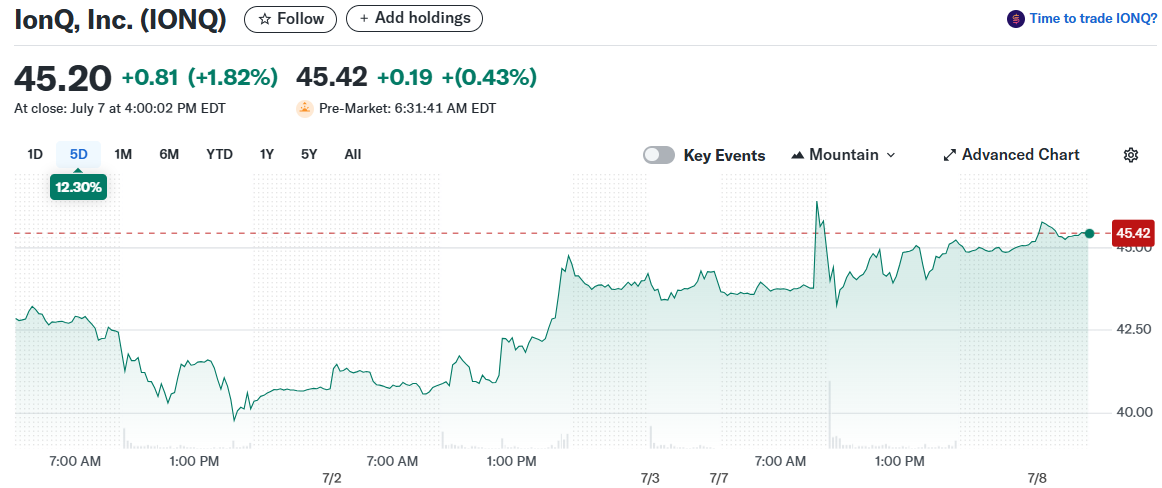TLDR
- IonQ raised $1 billion in equity offering at $55.49 per share, representing 25% premium to previous closing price
- The funding brings company’s pro-forma cash to approximately $1.68 billion to drive growth toward commercialization
- Benchmark analyst raised price target to $55 from $50 and maintained Buy rating after management meeting
- Company plans to scale from 256 physical qubits in 2026 to 2 million physical qubits by end of decade
- IonQ is positioning itself as leader in both quantum computing and quantum networking with diversified revenue streams
IonQ just pulled off what appears to be the largest single-institutional investment in quantum computing history. The company announced a $1 billion equity offering that priced at a hefty premium to recent trading levels.
IonQ raised $1 billion in a sale of stock and warrants to an affiliate of Susquehanna in a deal priced at a 25% premium to the quantum computing company’s closing price on Thursday https://t.co/umMz2jt2sb
— Bloomberg (@business) July 7, 2025
The offering priced at $55.49 per share on Monday morning. That represents a 25% premium to IonQ’s closing price on July 3rd.

Heights Capital Management stepped up as the buyer for this massive investment. J.P. Morgan served as the sole underwriter for the transaction.
The deal structure includes 14,165,708 shares of common stock and pre-funded warrants for 3,855,557 additional shares. IonQ also issued seven-year warrants to purchase 36,042,530 shares at $99.88 per share.
CEO Niccolo de Masi called the investment validation of the company’s technical progress and recent acquisitions. The funding brings IonQ’s pro-forma cash position to roughly $1.68 billion as of March 31, 2025.
This cash infusion comes at a crucial time for IonQ’s expansion plans. The company is working to scale up its quantum computing capabilities while building out its networking business.
Analyst Backing and Market Position
Benchmark analyst David Williams raised his price target to $55 from $50 following a fireside chat with management. He maintained his Buy rating on the shares.
Williams highlighted IonQ’s dual approach to quantum computing and networking. The company views these two areas as symbiotic rather than separate business lines.
The analyst noted that IonQ has “the most commercial business model and differentiated go-to-market strategy among peers.” This positioning could prove valuable as the quantum industry matures.
IonQ’s revenue comes from three main sources: hardware sales, quantum computing as a service, and applications. While applications currently represent a smaller portion of total revenue, management considers it the most important long-term value driver.
The company’s strategy focuses on landing customers with either computing or networking solutions, then expanding those relationships. This approach aims to build a sticky ecosystem around IonQ’s technology.
Technical Roadmap and Scaling Plans
IonQ has mapped out an ambitious scaling timeline for its quantum systems. The company plans to grow from 256 physical qubits in 2026 to 2 million physical qubits by 2030.
The roadmap also calls for 80,000 logical qubits by the end of the decade. Management expressed confidence in this technical timeline during recent investor discussions.
CEO de Masi has argued that quantum networking offers a better path to building larger quantum computers than simply adding more qubits. “If you just picked a better path, it doesn’t take a lot of qubits to do useful work. We scale through quantum networking,” he told Barron’s.
The company’s end goal involves building a quantum internet with its computers serving as primary nodes. Quantum networking connects multiple quantum processors to pool computing power and overcome limitations of single machines.
This approach addresses performance issues caused by environmental disturbances by distributing workloads across a network. IonQ believes this strategy gives it an edge over competitors focused solely on adding qubits.
The quantum computing industry faces ongoing challenges with error rates as systems scale up. More qubits generally mean higher error likelihood, making IonQ’s networking approach potentially more viable.
De Masi previously claimed IonQ would become “the Nvidia of quantum computing,” helping send the stock up 37% on May 22. The company aims to provide end-to-end quantum solutions addressing a wider range of customer needs.






